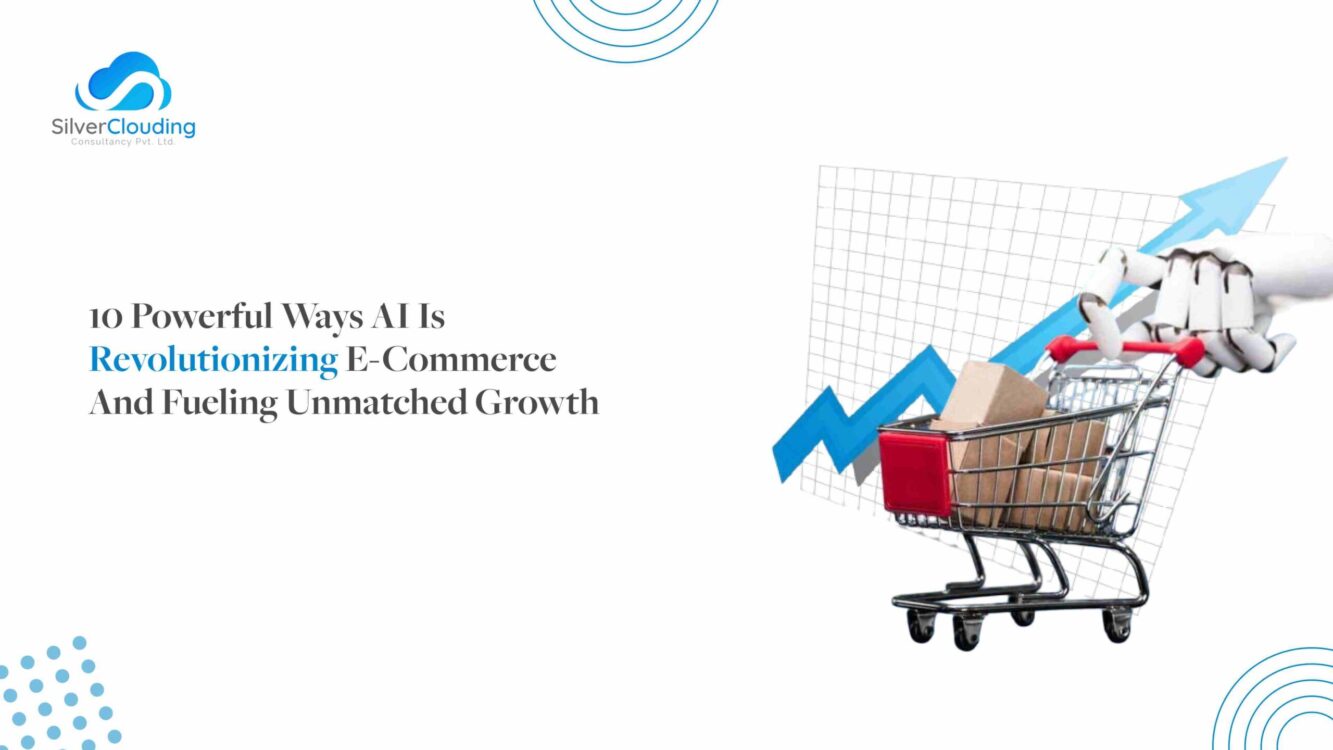Introduction
Today, people look for a personalized and straightforward shopping experience. Integrating AI in automating the e-commerce market boosts predictive recommendation systems. E-commerce with AI revolutionizes retail success, making 55% to 75% of business leaders follow this concept. AI also helps retailers ensure hyper-personalized experiences and set a new standard for operational efficiency.
This article explores the prime roles of AI in automating the entire system and revolutionizing e-commerce. So, read this content thoroughly and equip yourself with the details that drive unmatched growth.
AI in eCommerce: An Overview
AI in e-commerce works by nurturing a vast amount of data from different sources. This concept helps retailers study customer interactions, browsing history, and market trends. AI’s sophisticated machine learning algorithms help identify trendy business patterns, predict preferences, and make the most accurate decisions. Also, AI continuously learns and upgrades its performance with time. It starts collecting and analyzing more data to ensure accuracy and efficiency in its predictions and recommendations.
Remember, AI algorithms are the most fruitful ways to help automate business in many aspects. So, consider artificial intelligence your helping hand to achieve sharp growth in your e-commerce marketing.
1. Improved Shopping Experience
Personalization is the key feature that AI introduces. This feature lets online retailers study customers’ behavior, past purchases, location, and preferences. Therefore, they can deliver customized product recommendations and targeted marketing messages. E-commerce with AI improves customer satisfaction by providing 24/7 customer support and guiding customers regarding purchasing. Chatbots offer required responses that minimize waiting times.
2. Dynamic Pricing Optimization
Pricing is another vital thing that can determine e-commerce success. Artificial intelligence helps businesses pull it off with precision. How? AI-powered pricing tools can track competitor prices, fluctuating demands, product availability, and more. Therefore, online retailers can determine the optimal price quickly and accurately. It ensures competitiveness without any negative impact on the profit margins.
For example, Amazon and Mintra are top e-commerce giants that use AI-powered dynamic pricing tools. It makes retailers increase profits by 143% per year on average. So, dynamic pricing optimization helps stay aligned with ever-changing market conditions and improve inventory management.
3. Uninterrupted Customer Support
AI chatbots are evolving with time. The availability of 24/7 customer assistance helps make product inquiries easy and track orders. AI-based advanced systems help make returns easy and remove the chance of human errors. It makes customers feel supported throughout shopping and enhances the overall experience.
4. Supply Chain Automation and Inventory Management
Retailers use top-notch AI algorithms to analyze the required data and follow the demanding trends. Predictive analytics tools compare seasonal changes and consumer behavior, speeding up order fulfillment. Remember, an AI-focused inventory management system helps manage the risk of stockouts or overstocking. Therefore, AI helps maintain optimal stock levels.
5. Fraud Detection and Security Management
With the development of e-commerce platforms, the chance of cyber threats and fraudulent transactions increases. Here comes the importance of fraud detection and security management in revolutionizing e-commerce. It easily detects the patterns, indicating fraud behavior. AI-based security management systems identify issues like multiple orders from the same IP address where different credit or debit cards have been used. Irregular login locations are also a suspicious activity that AI detects, ensuring protection for businesses and customers.
6. AI Image Recognition and Visual Search
Pairing e-commerce with AI helps businesses grow rapidly by assisting people in finding visually similar items. For example, one can buy a dress using an online app like Myntra or Flipkart immediately after seeing a dress on Instagram or anywhere else. Some e-commerce giants like ASOS, Amazon, and Pinterest are already adding this feature to ensure an engaging shopping experience.
7. Voice Commerce Implementation
Voice commerce is one of the most vital features of artificial intelligence that allows users to search for particular products, make orders, and track deliveries. Not only consumers but also voice commerce enables retailers to understand context, intent, and preferences. For example, Amazon Alexa, Google Assistant, and Apple’s Siri are the top AI products that change the direction of online shopping.
8. Consumer Behavior Analysis for Staying Competitive
Do you want to stay competitive in this e-commerce world? Try to understand customer preferences first. For that, you need to study their purchase behavior to achieve success. AI-based analytics tools track customer reviews. It also gives an idea of customer feedback, social media, and browsing history. Therefore, it helps businesses assess what shoppers like or dislike and allows them to respond to issues before they escalate. This AI feature enables customers to make informed decisions and allows companies to determine the right marketing strategies.
9. Smart Email and Ad Hyper-Personalized Campaigns
AI enables the digital marketing team to run hyper-personalized campaigns, enhancing their effectiveness. Also, AI predicts optimal sending times with personalized subject lines and helps segment audiences. This feature of AI integration ensures that ads are shown to the right people at the right time. It increases ROI and improves the overall customer experience.
10. AI in Trend Prediction
Trend prediction can be a key that helps businesses step into a new level of success by analyzing enormous datasets. AI studies purchase behavior and tracks social media buzz to discover upcoming trends before they reach the mainstream. It allows online retailers to design new products, plan collections, and optimize inventory. If you want to keep your business aligned with the market instead of reacting to it, you can not deny the importance of AI in trend prediction. So there will be no risk of missed opportunities or obsolete inventory.
Final Thoughts
Artificial intelligence brings new opportunities for e-commerce marketing and powers the future. From resolving customer queries to ensuring protection, AI drives unmatched customer support. Integrating artificial intelligence features is wise if you run an online store and want to succeed. Contact Silver Clouding for support. Our experienced and certified e-commerce developers can help you integrate AI into your e-commerce business. So, reach out to us to adopt AI and get ready to enjoy unprecedented growth.
References
https://www.airops.com/blog/how-ai-is-used-in-e-commerce
https://sendbird.com/blog/ai-use-cases-ecommerce
https://keymakr.com/blog/beyond-the-product-exploring-emerging-applications-of-ai-in-e-commerce





Leave A Reply
You must be logged in to post a comment.